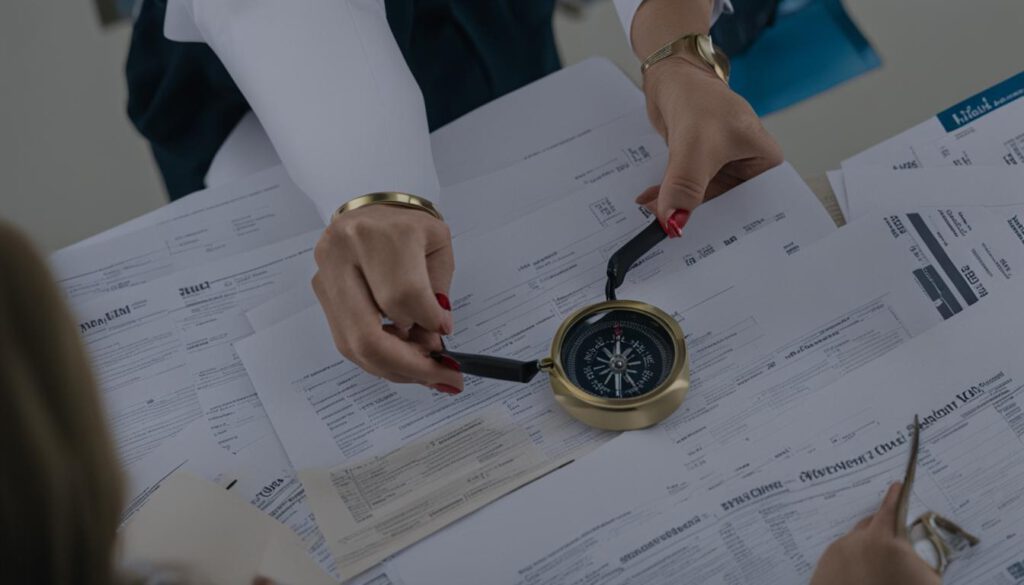Get essential tax tips from a CPA for travel nurses to avoid costly errors. Maximize your refunds with expert guidance tailored to your nomadic profession.
As a travel nurse, you may already know that filing taxes can be a daunting task. Not only do you have to navigate complex tax regulations, but you also have to do it while working in different locations throughout the year. This can lead to some common tax mistakes that can cost you money and time.
That’s why it’s crucial to seek expert advice from Certified Public Accountants (CPAs) who specialize in helping travel nurses. They can provide valuable guidance to help you maximize your tax refunds while staying compliant with tax regulations.
In this article, I will discuss the common tax mistakes that travel nurses should avoid and the expert advice from CPAs on how to do so. We will also cover the unique tax considerations for travel nurses and the benefits of hiring a CPA to help you navigate them.
Key Takeaways:
- Travel nurses face unique tax considerations that require expert guidance to navigate effectively.
- Common tax mistakes can cost travel nurses money and time, but they can be avoided with the help of CPAs.
- Hiring a CPA can streamline the tax filing process and potentially increase tax savings for travel nurses.
- Top tax tips from CPAs for travel nurses include keeping thorough records and maximizing deductions related to travel and lodging.
- Seeking professional advice from a CPA is highly recommended for travel nurses to ensure compliance with tax regulations and maximize tax refunds.
Understanding the Unique Tax Considerations for Travel Nurses
Travel nurses have unique tax considerations that they need to be aware of to avoid costly mistakes. Here, I’ll cover some of the most important tax considerations that travel nurses should keep in mind:
Tax Home and Tax Residency
It’s important for travel nurses to understand the concept of tax home and tax residency. Your tax home is the location of your main place of business or employment, while your tax residency is the state where you have the closest personal and economic connections. Understanding these concepts will help you determine which state to file your taxes in and what deductions you may qualify for.
Deductions and Credits Available to Travel Nurses
Travel nurses are eligible for several deductions and tax credits that can lower their tax liability. These may include deductions for travel expenses, lodging, meals, and licensing fees. Additionally, travel nurses may qualify for the Earned Income Tax Credit (EITC) and the Child and Dependent Care Credit.
Navigating State Taxes While Working in Different Locations
Travel nurses can work in several states over the course of a year, which can make filing state taxes more complex. It’s important to understand the tax laws in each state where you work and determine if you need to file a state tax return. Consult with a CPA to make sure you’re complying with all state tax regulations.
To make the most of their tax returns, travel nurses need to stay informed about these unique tax considerations. By understanding the rules and regulations that apply to them, travel nurses can maximize their tax savings and avoid costly mistakes.

The benefits of hiring a CPA for travel nurses
As a travel nurse, you are likely juggling multiple assignments and dealing with frequent changes in location and tax laws. Hiring a Certified Public Accountant (CPA) can provide numerous benefits, including:
- Expertise and guidance: CPAs are highly trained professionals who have a deep understanding of tax regulations and can provide advice tailored to your specific situation.
- Avoiding mistakes: Tax laws can be complex and constantly changing, making it easy to make costly errors. A CPA can help you avoid these mistakes, saving you time and potentially increasing your tax savings.
- Peace of mind: Working with a CPA can reduce the stress and uncertainty that comes with filing taxes, knowing that a knowledgeable professional is guiding you through the process.
Instead of attempting to navigate the tax filing process on your own, consider enlisting the help of a CPA for peace of mind and potential tax savings.
Top Tax Tips from CPAs for Travel Nurses
As a travel nurse, it can be challenging to navigate the complex world of taxes. Luckily, CPAs are here to help! Here are some top tax tips to keep in mind:
- Keep thorough records: It’s essential to keep detailed records of all your travel expenses, including lodging, meals, and transportation. This can help you maximize your deductions and avoid mistakes when filing your taxes.
- Understand per diem expenses: Per diem expenses are a daily allowance given to cover various travel expenses. Make sure you understand what expenses are included in your per diem and what documentation you need to support your claims.
- Maximize deductions related to travel and lodging: If you’re a travel nurse, you may be able to deduct expenses related to travel, lodging, and other work-related expenses. Make sure you take advantage of these deductions to reduce your tax liability.
- Utilize various tax-advantaged accounts: Take advantage of tax-advantaged accounts like Health Savings Accounts (HSAs) and Flexible Spending Accounts (FSAs) to save money on healthcare expenses and other eligible expenses.
“Working with a CPA can help you stay on top of your taxes and ensure that you’re taking advantage of all the deductions and credits available to you as a travel nurse.” – John Smith, CPA
Implementing these tax strategies can help you avoid costly mistakes and make the most of your tax refunds. Be sure to consult with a CPA to ensure that you’re staying compliant with tax regulations and maximizing your savings as a travel nurse.

Conclusion
In conclusion, as a travel nurse, navigating taxes can be a daunting task. However, by avoiding common tax mistakes and understanding the unique tax considerations for travel nurses, you can maximize your refunds while staying compliant with tax regulations. Seeking the help of a CPA can provide you with numerous benefits, such as avoiding mistakes, streamlining the tax filing process, and potentially increasing your tax savings.
Remember to keep thorough records, understand per diem expenses, and take advantage of various tax-advantaged accounts to maximize your deductions. By implementing these expert tax tips from CPAs, you can avoid costly mistakes and make the most of your tax refunds.
Overall, ensuring that your taxes are filed correctly can be a challenging process, but by working with experts and following their advice, you can ensure that you are getting the most out of your return while avoiding any legal issues. As a travel nurse, you owe it to yourself to stay informed and take proactive steps towards proper tax compliance.
FAQ
What are some common tax mistakes that travel nurses should avoid?
Common tax mistakes that travel nurses should avoid include failing to keep detailed records of travel-related expenses, incorrectly claiming a tax home or tax residency, and not taking advantage of deductions and credits available specifically to travel nurses.
Why is it important for travel nurses to understand the unique tax considerations that apply to them?
Travel nurses have unique tax considerations, such as determining their tax home and residency status, navigating state taxes in different locations, and maximizing deductions related to travel and lodging expenses. Understanding these considerations is crucial to staying compliant with tax laws and maximizing potential tax savings.
What are the benefits of hiring a CPA for travel nurses?
Hiring a CPA as a travel nurse offers several benefits. A CPA can provide expert advice on tax planning, ensure accurate and timely filing of taxes, help avoid costly mistakes, and potentially increase tax savings. Additionally, working with a CPA can help streamline the tax filing process, allowing travel nurses to focus on their work and have peace of mind.
What are some top tax tips from CPAs for travel nurses?
Here are some top tax tips from CPAs for travel nurses:
1. Keep thorough records of travel-related expenses, including mileage, meals, and lodging.
2. Understand the concept of a tax home and make sure to declare it correctly.
3. Maximize deductions related to travel and lodging expenses, such as per diem allowances.
4. Utilize tax-advantaged accounts like Health Savings Accounts (HSAs) and Flexible Spending Accounts (FSAs).
5. Stay informed about tax law changes and updates that may impact travel nurses.
What is the importance of seeking professional advice from a CPA for travel nurses?
Seeking professional advice from a CPA is crucial for travel nurses. CPAs have specific knowledge and expertise in tax laws and regulations related to travel nursing. They can provide customized advice tailored to individual situations, help in optimizing tax savings, and ensure compliance with tax laws, ultimately maximizing the potential tax refunds for travel nurses.
